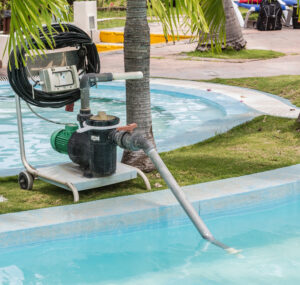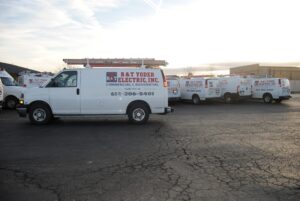
Installing a pool is a complex project, requiring excavating, leveling, and — yes — electrical wiring. Depending on several factors, your pool may have different power needs than your neighbors. Let’s look at what kind of power your pool pump may need based on its specifications and other considerations.
Your electrical panel setup
The first thing you’ll need to look at (or rather, your professional pool electrician will look at) will be your current electrical panel setup. Most likely, you won’t have the necessary open circuits requiring the installation of a sub-panel. Of course, you may already have a sub-panel if you have a detached garage or another backyard feature such as a spa. Understanding what you have is the first step in determining the kind of power your pool pump needs.
Pumps for above-ground pools
If you have an above-ground pool, the first thing to remember is that your wiring should adhere to all safety standards. Next, how many gallons does your pool hold? Then, how many hours per day will your pool be running? Although the latter doesn’t necessarily mean you can skip out on the proper sub-panel setup, it will at least give you a general idea of the demands you’ll be placing on your home’s power system.
Finally, pumps can cycle a set amount of water per hour. If your pump isn’t large enough to fully circulate the water in your pool, it’ll be too undersized. Potentially, you’ll need to run it longer, which will lead to overall higher electric bills.
Essentially, there’s the right mix between your pool’s capacity, your operational hours, and the size of pump you purchase. That mix can then give you an estimate as to the power impact of your pool.
Pumps for in-ground pools
For an in-ground pool, you’ll use a similar formula as above to calculate your capacity, usage, and size of the pump. However, in-ground pools can have additional features such as built-in lights. This will also factor into the overall usage of your pool and the demands it puts on your power system.
What kind of power does my pool pump need?
So what kind of power does your pool pump need? We recommend trenching and backfilling in most cases. This ensures that the wiring running from your pool and pump to your home is protected from water splashes. Some DIY solutions might simply run an extension cord from the pump to an outside outlet. Overall, we’d advise against this, instead encouraging our customers to view this as a long-term investment, one that should be completed correctly from Day One.
Columbus Ohio’s premier pool electrician
We’ve been serving the Central Ohio region since 2004 with our various pool electrician services as well as a wide range of residential and commercial options.
When it comes time to install or update your pool’s pump, lighting, and more, then give us a call. You can reach us at (614) 660-5879 or send us a message requesting more info here. We look forward to connecting with you!







